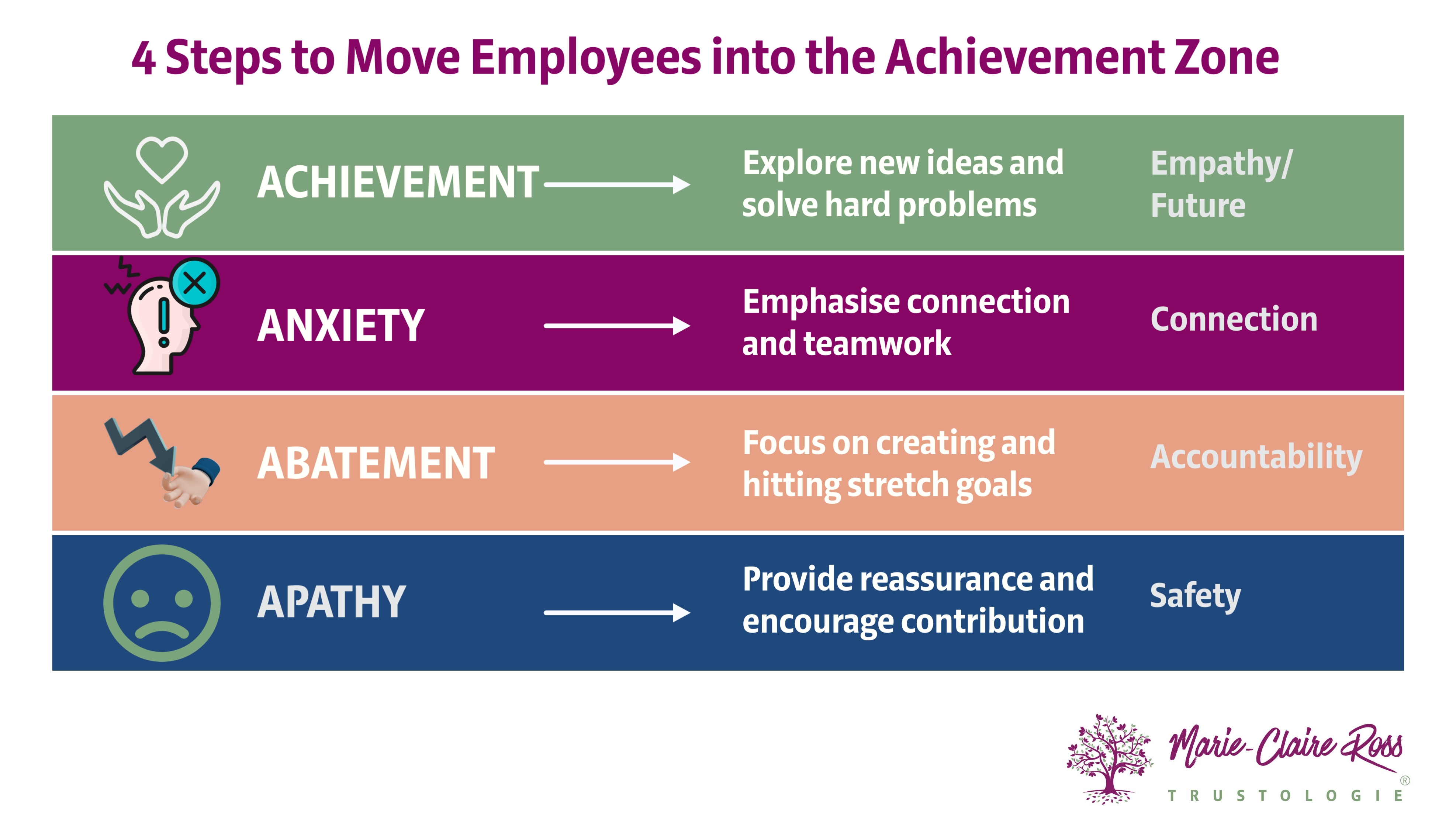11 min read
4 Practical Strategies for Better Emotional Management in the Workplace
I have a friend who often finds herself at the mercy of her emotions. Recently, she called me to rehash a confrontation she’d had with a group of...
Develop leaders, strengthen executive teams and gain deep insights with assessments designed to accelerate trust and performance.

Transform how your leaders think and perform with keynotes that spark connection, trust and high-performance cultures.

Explore practical tools, thought-leadership and resources to help you build trusted, high-performing teams.

Trustologie® is a leadership development consultancy founded by Marie-Claire Ross, specialising in helping executives and managers build high-trust, high-performing teams.

5 min read
Marie-Claire Ross : Updated on March 5, 2024

A common stressful experience for most managers is learning how to deal with a boss or leader who is unpredictable.
Not receiving clear expectations, priorities and deliverables impacts your success. It can feel particularly troublesome, if you are keen to work efficiently and not put extra pressure on your team.
To be clear, I am not talking about an unreasonable leader or even a workplace sociopath.
Typically, an unpredictable boss is well-meaning but they are hard to get hold of, keep changing their mind or seem distracted. They don't actually mean to be difficult, but changing priorities, intense pressures and their own lack of clarity can often mean they change their mind a lot. It is also possible you are reporting to a neurodivergent leader with ADHD or on the autism spectrum where their unpredictability is normal for them.
So let's take a look at six strategies to deal with an unpredictable boss.
1. Get to know them - It might seem strange, but dealing with an unpredictable authority figure requires understanding them better.
Understanding the context in which they are functioning is crucial. Spend time with them to understand their pressures, priorities, goals and challenges. Also, ask questions to understand their decision-making process. For example, "What's the thinking behind this initiative?" or "How do you think it will improve our workflow?"
Knowing what matters to them and what's important to their success ensures that you are more accepting of their inconsistencies and in alignment.
Consider asking them questions such as "What's something that you are proud of?" or "What is something that you keep thinking about with this project?"
2. Control your emotions - This can be difficult, but it is the hallmark of successful leaders. We can often feel disrespected by a boss who regularly cancels our one-on-ones or sends us an urgent email with unclear directives.
Remember that emotions give us important information and should not be ignored. However, we don't want to go running into our bosses' office and launch into an angry tirade about what we really think about them.
There are two things we need to learn to do.
The first is to control our reactions to their unpredictable behaviours. You want to get to a stage where you accept it as part of who they are and not see it as them deliberately trying to hurt you.
This requires letting go of any beliefs that you are wrong or at fault for having a leader that is inconsistent. Their behaviours are not a reflection on you as a person.
The second is to sit with your emotion and name it. Are you feeling frustrated? Are you angry? Are you overwhelmed? Why is the behaviour upsetting you? Know that your feelings are valid. Our emotions signal identify what is important to us.
Avoid staying in the negative emotion for a long period. The goal is to acknowledge it, explore it, then get them out of it. That means deciding on what action we need to take next to control the situation.
3. Clarify Priorities - A common challenge people face with their boss is when a leader sends an email requesting a deliverable in a short timeline.
Let's look at an example of a manager receiving a last minute request of a marketing report from their boss.
The manager quickly sets about delegating tasks to their team to get the report ready. Everyone stops what they are doing. Employees work after hours to get it done.
And then on the day of submitting the report, their boss says "thanks" and tells them he will look at it next week.
Situations like this create a lot of unnecessary stress, work and resentment. While you can blame your boss for making you change your team's work plans for the last three days, it also signals you need to put clearer boundaries around priorities.
Next time, you receive an urgent request, have a discussion to flesh out whether the request is a priority or just a nice to have. Call your boss or arrange a meeting to better manage the deadline.
In the book, The Microstress Effect, by Rob Cross and Karen Dillon, they uncovered a quick hack to make sure you are aligned on requests with your boss. Using a 10 point rating scale, ask your manager to rate their request:
1 means "I know this might be a wild idea, but it's something I'd love for you to keep in the back of your mind."
5 means "This is something we need to explore at some point."
10 means "This is a priority. I'd like you to work on this now, and I understand it will take priority over other work."
Leaders often have knee-jerk reactions and make a frantic request without thinking through the consequences.
Instead of immediately jumping into action, have a discussion to determine if the request is truly a priority or just a preference. It's important to avoid automatically saying "yes" to every request and instead evaluate whether it aligns with your team's priorities.
4. Clarify Expectations
Another area where unpredictable bosses cause confusion is with failing to specify their expectations.
It is unwise to undertake a directive without getting clear on what they mean or what they want.
Never interpret unclear instructions. It's your responsibility to find out what is required and what standards are needed. Sometimes they don't know, so you need to ask them the right questions to help uncover what it is they really want.
Good questions to ask include:
"What does success look like for this task?"
"What would you consider a poor quality report?"
"What are the client expectations for this?"
5. Oblivious to Others
As Robert Sutton, an organisational psychologist says, power and prestige can cause leaders to focus more on themselves, less on others, and act like the rules don’t apply to them.
Executives don't fully realise their outsized influence in a meeting, how people feel obligated to laugh at their jokes or know when to discredit an off-hand remark.
Sutton shares a story of a new CEO to a Fortune 10 company, who at one of the first company breakfast events he attended, nonchalantly remarked, "Where are the blueberry muffins?"
From then on, every company event organiser would ensure there were plates of blueberry muffins available, no matter which office he travelled to around the world. Unfortunately, no-one thought to verify with him whether blueberry muffins were his favourite (they were not). He also didn't connect the dots as to why blueberry muffins featured at every company event.
As human being we are wired to watch what powerful people are doing, so we don't displease them. But this automatic tendency can mean that we ascribe more meaning to meaningless remarks. If you have an unpredictable boss, make sure you qualify any remarks they make, before ascribing them into the company commandments.
6. Make a Decision
During time of change, it's common for executive leadership to not provide much direction. Your boss might also be suitably vague.
Waiting for clarity from up high can be a big mistake. If you keep asking your manager for direction and fail to receive a satisfactory response, or they keep changing their mind, you have two options - you let your team feel directionless or you take the reins.
As a leader, your people need to have an anchor. This implies that you must firmly establish your position and make a decision. Even though your position might change, at least it's something for your team to work with, until your are giving the latest directions.
Keep taking action, make decisions and keep forging ahead until you are told to stop. Provide the right leadership example to your team, even when your boss cannot.
If you find yourself unable to present a clear vision, it's likely that you understand the underlying reasons for your chosen direction. Take the time to delve into the driving purpose behind your actions and communicate this insight with your team.
Dealing with a boss lacking clarity can induce uncertainty and anxiety, but it's also an opportunity for growth.
Rather than blaming them, take charge by seeking clarity through effective communication. Ask pertinent questions, repeat their responses, and secure their agreement. Mastering this skill will earn you respect and recognition in the long term.

11 min read
I have a friend who often finds herself at the mercy of her emotions. Recently, she called me to rehash a confrontation she’d had with a group of...

9 min read
True leadership presence isn’t a performance or a set of charisma hacks; it is the felt experience of who you are being in the room. By cultivating...

13 min read
As teams return from their summer (or winter) break, you may notice subtle shifts in your team’s energy. Even if the end of year was positive, a new...

According to the Hoffman Institute, 90% of our reactions are emotional. In fact, our emotions respond 400 times faster than our intellect.
In my research with high performers, one of the stand out themes was their confidence in tackling a difficult conversation. While none of them felt...

We've all heard the term "Death by PowerPoint" and the majority of us have been scarred by poor presentations and classroom learning techniques, at...